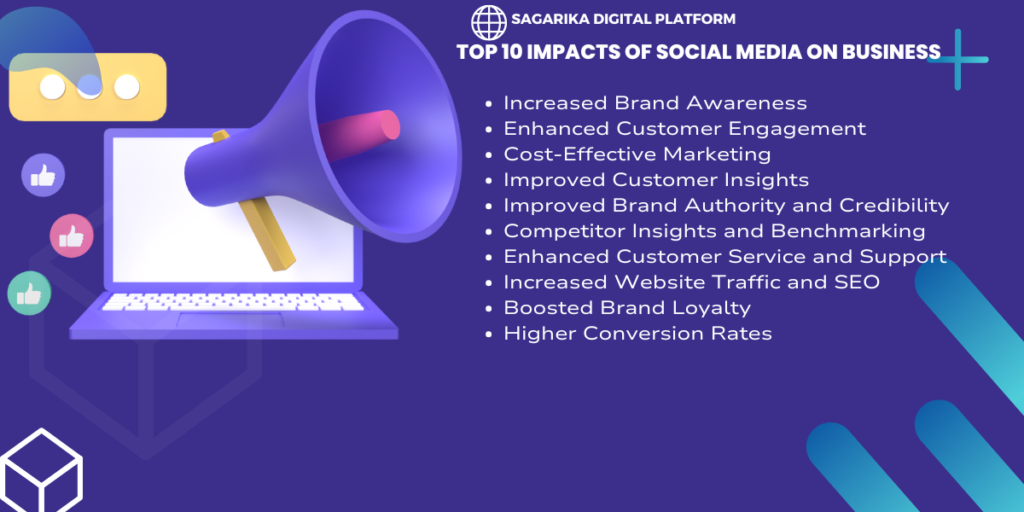Social Media Marketing

Social Media Marketing
In the world of digital marketing, social media marketing has become one of the most significant and effective strategies. It has radically altered how companies interact with their clientele and advertise their goods and services over the last ten years. Platforms, such as Facebook, Instagram, LinkedIn, and TikTok, have developed into enormous ecosystems that allow marketers to connect with large, niche markets. Social media marketing has a plethora of diverse benefits that are highly valuable to companies of all kinds. An extensive examination of the main advantages of social media marketing may be found here.
Social media marketing’s unmatched reach is one of its main benefits. Social media platforms give businesses access to a worldwide audience, in contrast to traditional marketing channels. Platforms such as Facebook, Instagram, Twitter, LinkedIn, YouTube, and Instagram are used by billions of people, giving marketers access to markets that were previously unreachable. Social media offers businesses an economical and effective means of spreading their message, regardless of whether they are targeting a local audience or growing internationally.
Additionally, social media is available around-the-clock, allowing businesses to remain “open” at all times. Even when the business is not physically operating, customers from different time zones can interact with the material, ask questions, and make purchases. This constant availability greatly raises potential engagement and brand visibility.
In contrast to conventional marketing techniques like print, radio, or television advertising, social media marketing is significantly less expensive. Most social media sites allow you to register for an account for free, and even paid advertising on these sites—such as Facebook or Instagram ads—is typically less expensive than more conventional kinds of advertising.
Social media marketing has the potential to revolutionize the way small and startup companies with tight marketing budgets do business. Brands can gain substantial visibility for relatively little money. Furthermore, because social media advertising are scalable, companies may begin with a lower budget and scale up as they see results.
The capacity to deliver highly targeted advertising is one of social media marketing’s biggest advantages. Numerous pieces of user data, such as age, location, hobbies, activities, and more, are gathered by social media sites like Facebook and Instagram. Businesses can build tailored ads with this data, and only the most relevant consumers will see them.
Businesses can target particular groups or demographics based on precise criteria by using comprehensive targeting choices. A real estate firm may target consumers seeking for homes in a specific area, while a fashion brand might focus on young ladies interested in sustainable fashion between the ages of 18 and 24. The return on investment (ROI) is increased when marketing efforts are focused on the target audience that is most likely to convert.
Social media marketing goes beyond simple targeting to include retargeting, which reaches people who have already connected with a brand but did not finish a desired activity, like making a purchase. Because they remind potential customers of their interest, retargeting advertising are effective and frequently result in greater conversion rates.
Social media channels are great for raising brand exposure and visibility. Businesses may maintain their brand in the minds of their audience by producing entertaining and relevant material on a frequent basis. The more frequently consumers see a brand’s posts, the more likely they are to recall and recognize the brand, which is an important part of developing brand loyalty.
Furthermore, viral content can significantly boost a brand’s visibility. The sharing feature of social media enables users to effortlessly share content with their networks, exponentially increasing its reach. A single post, video, or image that resonates with an audience can be shared thousands of times, resulting in tremendous exposure at little or no expense to the business.
Between companies and their audiences, social media marketing promotes two-way contact. Social media gives businesses instantaneous, direct communication with their customers, in contrast to traditional marketing strategies that are primarily one-sided. Because consumers value the chance to speak with their favorite brands directly, this face-to-face engagement strengthens relationships.
Social media gives businesses the ability to answer inquiries, offer customer support, get reviews, and even publicly address grievances. Reactiveness and engagement show that firms care about their customers, and this can increase trust and brand loyalty.
Furthermore, social media platforms are great for developing campaigns that are participatory. Users can actively participate in a brand’s marketing initiatives through polls, quizzes, sweepstakes, and user-generated content campaigns. In addition to increasing engagement, this type of interactive material gives users a feeling of belonging and community.
Social media networks give companies access to priceless audience data. Businesses can monitor important data like engagement rates, follower growth, reach, impressions, and more with tools like Facebook Insights, Instagram Analytics, and Twitter Analytics. Brands can use this data to better assess audience response and content performance.
Social media provides information on consumer preferences and habits in addition to standard measurements. Businesses may better grasp what their audience values, what they’re seeking for, and what challenges or problems they need answers for by keeping an eye on conversations, comments, and feedback. Enhancing general business procedures, creating new products, and improving marketing tactics can all be done with the use of this data.
Because it encourages genuine and individualized engagement, social media marketing can result in increased conversion rates. Customer reviews, testimonials, and user-generated content are examples of social evidence that has a big impact on buying decisions. Prospective buyers are more likely to interact and trust a brand when they witness other people using it with satisfaction.
To further streamline the shopping procedure, a lot of social media platforms have direct “buy now” or “shop now” links. By integrating social media with e-commerce platforms, businesses can lower the barrier between interest and purchase by enabling customers to make purchases straight from social network posts.
A primary objective of social media marketing is increasing website traffic for brands. There can be a call-to-action (CTA) in every social media post, advertisement, or piece of content that invites users to visit the business’ website. This raises the possibility that a visitor may complete a form, make a purchase, or sign up for a newsletter in addition to increasing website traffic.
A business can generate a consistent flow of prospective consumers by consistently posting blog entries, product updates, or promotional offers on social media. This method effectively directs social media users to the website of the business.
Using social media to promote brand loyalty is a great strategy. Through the regular delivery of high-quality content, organizations can maintain audience engagement and loyalty. Consumers who have a sense of connection to a brand are more likely to remain devoted over time, and social media provides the ideal setting for fostering that relationship.
Social media platforms also give businesses the chance to create communities centered around their brands. By means of Facebook groups, Twitter conversations, or Instagram Live sessions, companies may cultivate a feeling of inclusion and camaraderie among their audience. Social media’s ability to foster communities can improve brand loyalty and promote word-of-mouth advertising.
Lastly, social media marketing gives companies a boost over rivals. Businesses that are visible and participatory on social media can set themselves apart from rivals who might not be as involved or visible. In a manner not possible with other marketing channels, social media gives brands the opportunity to highlight their distinct character, principles, and products.
Businesses can also utilize social media to track competitors, find new possibilities, and remain current with industry trends. Businesses can establish themselves as industry leaders and innovators by being active on social media.\
Conclusion
The benefits of social media marketing are obvious: it gives companies an affordable, effective, and focused means to connect with clients, reach a worldwide audience, and create enduring connections. Social media marketing has completely changed how businesses sell themselves in the digital age. Benefits include higher client loyalty, improved brand exposure, and website traffic. Social media will continue to be a vital tool for companies looking to expand, compete, and prosper as the market changes.
